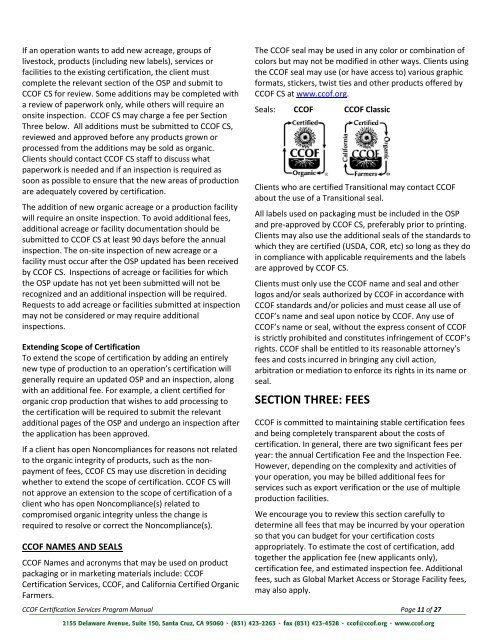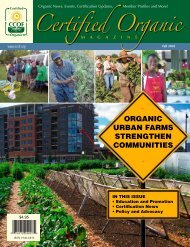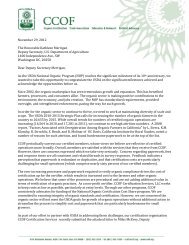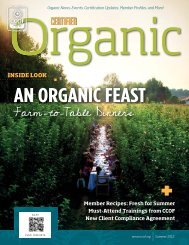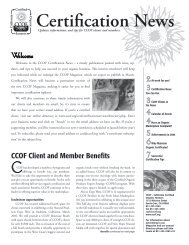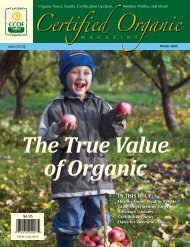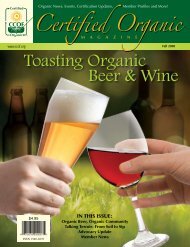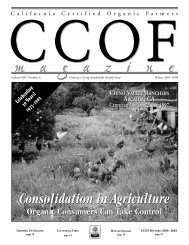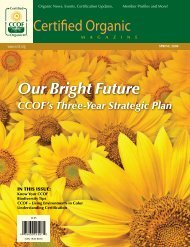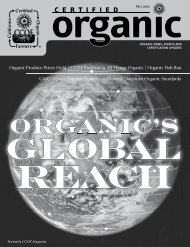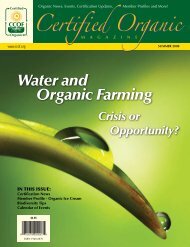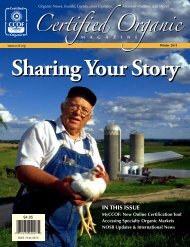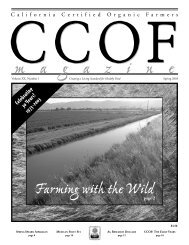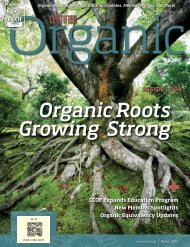CCOF Certification Program Manual- DISINTEGRATED
CCOF Certification Program Manual- DISINTEGRATED
CCOF Certification Program Manual- DISINTEGRATED
Create successful ePaper yourself
Turn your PDF publications into a flip-book with our unique Google optimized e-Paper software.
If an operation wants to add new acreage, groups oflivestock, products (including new labels), services orfacilities to the existing certification, the client mustcomplete the relevant section of the OSP and submit to<strong>CCOF</strong> CS for review. Some additions may be completed witha review of paperwork only, while others will require anonsite inspection. <strong>CCOF</strong> CS may charge a fee per SectionThree below. All additions must be submitted to <strong>CCOF</strong> CS,reviewed and approved before any products grown orprocessed from the additions may be sold as organic.Clients should contact <strong>CCOF</strong> CS staff to discuss whatpaperwork is needed and if an inspection is required assoon as possible to ensure that the new areas of productionare adequately covered by certification.The addition of new organic acreage or a production facilitywill require an onsite inspection. To avoid additional fees,additional acreage or facility documentation should besubmitted to <strong>CCOF</strong> CS at least 90 days before the annualinspection. The on-site inspection of new acreage or afacility must occur after the OSP updated has been receivedby <strong>CCOF</strong> CS. Inspections of acreage or facilities for whichthe OSP update has not yet been submitted will not berecognized and an additional inspection will be required.Requests to add acreage or facilities submitted at inspectionmay not be considered or may require additionalinspections.Extending Scope of <strong>Certification</strong>To extend the scope of certification by adding an entirelynew type of production to an operation’s certification willgenerally require an updated OSP and an inspection, alongwith an additional fee. For example, a client certified fororganic crop production that wishes to add processing tothe certification will be required to submit the relevantadditional pages of the OSP and undergo an inspection afterthe application has been approved.If a client has open Noncompliances for reasons not relatedto the organic integrity of products, such as the nonpaymentof fees, <strong>CCOF</strong> CS may use discretion in decidingwhether to extend the scope of certification. <strong>CCOF</strong> CS willnot approve an extension to the scope of certification of aclient who has open Noncompliance(s) related tocompromised organic integrity unless the change isrequired to resolve or correct the Noncompliance(s).<strong>CCOF</strong> NAMES AND SEALS<strong>CCOF</strong> Names and acronyms that may be used on productpackaging or in marketing materials include: <strong>CCOF</strong><strong>Certification</strong> Services, <strong>CCOF</strong>, and California Certified OrganicFarmers.The <strong>CCOF</strong> seal may be used in any color or combination ofcolors but may not be modified in other ways. Clients usingthe <strong>CCOF</strong> seal may use (or have access to) various graphicformats, stickers, twist ties and other products offered by<strong>CCOF</strong> CS at www.ccof.org.Seals: <strong>CCOF</strong> <strong>CCOF</strong> ClassicClients who are certified Transitional may contact <strong>CCOF</strong>about the use of a Transitional seal.All labels used on packaging must be included in the OSPand pre-approved by <strong>CCOF</strong> CS, preferably prior to printing.Clients may also use the additional seals of the standards towhich they are certified (USDA, COR, etc) so long as they doin compliance with applicable requirements and the labelsare approved by <strong>CCOF</strong> CS.Clients must only use the <strong>CCOF</strong> name and seal and otherlogos and/or seals authorized by <strong>CCOF</strong> in accordance with<strong>CCOF</strong> standards and/or policies and must cease all use of<strong>CCOF</strong>’s name and seal upon notice by <strong>CCOF</strong>. Any use of<strong>CCOF</strong>’s name or seal, without the express consent of <strong>CCOF</strong>is strictly prohibited and constitutes infringement of <strong>CCOF</strong>’srights. <strong>CCOF</strong> shall be entitled to its reasonable attorney’sfees and costs incurred in bringing any civil action,arbitration or mediation to enforce its rights in its name orseal.SECTION THREE: FEES<strong>CCOF</strong> is committed to maintaining stable certification feesand being completely transparent about the costs ofcertification. In general, there are two significant fees peryear: the annual <strong>Certification</strong> Fee and the Inspection Fee.However, depending on the complexity and activities ofyour operation, you may be billed additional fees forservices such as export verification or the use of multipleproduction facilities.We encourage you to review this section carefully todetermine all fees that may be incurred by your operationso that you can budget for your certification costsappropriately. To estimate the cost of certification, addtogether the application fee (new applicants only),certification fee, and estimated inspection fee. Additionalfees, such as Global Market Access or Storage Facility fees,may also apply.<strong>CCOF</strong> <strong>Certification</strong> Services <strong>Program</strong> <strong>Manual</strong> Page 11 of 27


